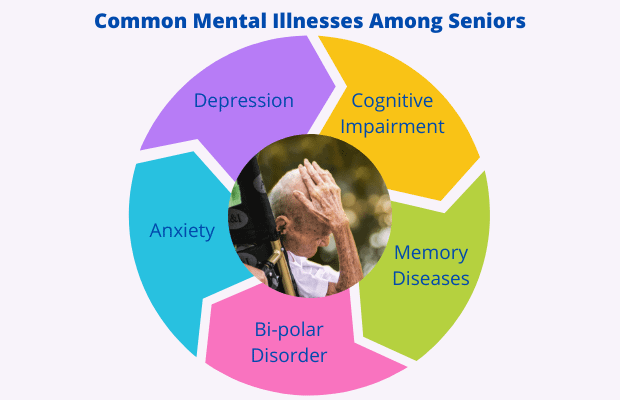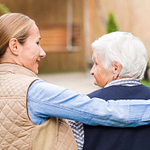Understanding the Importance of Mental Health in the Elderly
Mental health plays a pivotal role in the overall well-being of older adults, often dictating their quality of life. It’s not just about the absence of mental disorders, but also encompasses emotional, psychological, and social well-being. According to the World Health Organization (WHO), approximately 15% of adults aged 60 and over suffer from a mental disorder.
Common Mental Health Issues Among the Elderly
Depression and anxiety rank among the most common mental health issues in the elderly. Other prevalent conditions include dementia and Alzheimer’s disease, which affect memory and cognitive function. The Alzheimer’s Association reports that Alzheimer’s is the 6th leading cause of death in the United States.

Impact of Mental Well-being on Overall Health and Quality of Life
Mental health is a crucial determinant of quality of life and overall health in older adults. Mental well-being influences physical health, independence, social interactions, and the capacity to cope with life changes. Poor mental health can exacerbate physical ailments and lead to a diminished quality of life. Hence, promoting mental health is pivotal for a safe and happy life in old age. Mental Health America provides excellent resources for understanding and promoting mental well-being in the elderly.
Recognizing the Signs of Mental Health Challenges in Seniors
In the golden years of life, mental health challenges like depression and anxiety can manifest subtly. These conditions often bear symptoms such as persistent sadness, excessive worry, confusion, social withdrawal, and changes in appetite or sleep patterns. [source]

Early detection and intervention in these cases are crucial. It allows for prompt treatment, which can significantly improve the quality of life for seniors. [source]
The Role of Caregivers in Recognizing Mental Health Signs
Caregivers play an instrumental role in identifying these signs. Their close relationship with seniors provides them with the unique ability to notice subtle changes in behavior or mood. It is essential they stay vigilant and seek professional help when necessary. [source]
Fostering a Positive Environment for Mental Well-being
The significance of a positive environment in promoting mental health cannot be overstated, especially for the elderly. A supportive and positive atmosphere fosters a sense of belonging, reduces stress, and enhances the overall mental well-being of older adults.
Strategies to Create a Positive Environment for the Elderly
- Encourage participation in recreational activities that promote physical fitness and social interaction.
- Create an environment that is free from hazards and rich in positive stimuli – bright colors, natural light, and comfortable furnishings.
- Respect their privacy and independence to instill a sense of dignity and self-worth.
Role of Caregivers, Family, and Community
The role of caregivers, family, and community is crucial in building such supportive environments. Their understanding, patience, and consistent positive interactions can significantly enhance the mental well-being of the elderly. Studies have shown that active engagement and emotional support from these groups directly correlate with improved mental health in older adults.
Social interaction and relationships are vital for maintaining mental well-being, especially in the elderly. According to research, social connections can alleviate depression and anxiety, offering a sense of belonging and self-worth. Mental stimulation through interaction also helps keep the mind sharp, reducing the risk of cognitive decline.

How to Increase Social Interaction Among the Elderly
- Encourage participation in community activities, such as clubs or classes, focused on their interests.
- Promote regular family visits or interactions, fostering a sense of belonging.
- Advocate for therapy pets, proven to offer companionship and stimulate social interaction.
The Role of Technology in Promoting Social Interaction
Technology plays a significant role in promoting social interaction. Digital platforms like Skype or Facebook allow the elderly to connect with family and friends worldwide, reducing feelings of isolation. Online communities can also provide a platform to meet new people with similar interests. However, it’s essential to offer guidance on using these platforms safely.

Encouraging Regular Physical Activity for Mental Well-being in the Elderly
Physical activity plays a pivotal role in promoting mental health, particularly in the elderly. According to a study by National Institutes of Health, regular physical activity can mitigate the onset of depression and anxiety while improving cognitive function. It’s a natural mood booster, offering a sense of accomplishment, and encouraging social interaction.

Suitable Physical Activities for the Elderly
Choosing appropriate physical activities for seniors is vital. They should be low-impact and enjoyable, such as walking, yoga, swimming, or tai chi. The Centers for Disease Control and Prevention recommends at least 150 minutes of moderate-intensity aerobic activity per week for older adults.
The Role of Caregivers and Family
Caregivers and family members play a crucial role in encouraging and facilitating physical activity. They can ensure safe environments, motivate participation, and provide companionship during activities. The National Institute on Aging suggests they be involved in planning and implementing exercise routines.

Ensuring Proper Nutrition and Hydration for Mental Well-being
There exists a profound link between diet, hydration, and mental well-being. A balanced diet rich in nutrients can significantly enhance cognitive function and mood. Hydration, too, plays a critical role in maintaining mental health. Dehydration can lead to difficulties in concentration, mood swings, and in severe cases, delirium.
Nutritional Requirements for the Elderly
As we age, our nutritional needs change. The elderly require fewer calories but higher amounts of certain nutrients, including calcium and vitamin D for bone health, and B12 for brain function. To meet these needs, a diet rich in lean proteins, fruits, vegetables, and whole grains is recommended. For more information, see the National Institute on Aging’s guide to healthy eating for older adults.

Strategies for Ensuring Proper Nutrition and Hydration
- Plan Balanced Meals: Incorporate a variety of food groups to ensure a range of nutrients.
- Stay Hydrated: Seniors should aim for 8-10 glasses of water a day.
- Monitor Dietary Intake: Regularly track and assess dietary habits to identify and address nutritional gaps.
Importance of Cognitive Stimulation for Mental Health
Cognitive stimulation is a crucial element in maintaining mental health, particularly in seniors. This form of mental exercise keeps the mind active, thereby reducing the risk of cognitive decline. According to the National Center for Biotechnology Information, cognitive stimulation can improve memory, attention, and problem-solving skills.

Examples of Cognitive Stimulation Activities Suitable for Seniors
- Puzzles and brain games
- Reading and writing
- Art and music therapy
- Physical exercises with a cognitive challenge, such as dancing
- Social activities that require interaction and communication

Role of Caregivers, Family, and Community in Facilitating These Activities
Support from caregivers, family, and community is essential in facilitating cognitive stimulation activities. They can encourage participation, provide necessary resources, and create an engaging environment. The Alzheimer’s Association provides a comprehensive guide for caregivers on how to promote cognitive stimulation.

When and Why Should You Seek Professional Help?
Recognizing the need for professional help is crucial in maintaining mental well-being in the elderly. It’s time to seek support when seniors exhibit consistent signs of distress, such as persistent feelings of sadness, constant worry, difficulties in carrying out everyday activities, and significant changes in appetite or sleep. These may be signs of mental health conditions like depression or anxiety, which are not normal parts of aging and require professional intervention. The National Institute of Mental Health provides valuable information on this subject.
Available Mental Health Services for Seniors
Fortunately, there are plenty of resources available for elder mental health. Services range from counseling, medication management, support groups, to home care assistance. The National Council on Aging is a trusted resource for mental health services.
The Role of Caregivers in Mental Health
Caregivers play an instrumental role in the mental health of our seniors. They are often the first to notice changes in behavior and mood, making them key in the early detection and treatment of mental health issues. Their role extends to facilitating access to professional help, accompanying seniors to appointments and ensuring adherence to prescribed treatments. The National Institute on Aging offers valuable guidance for caregivers.
.





